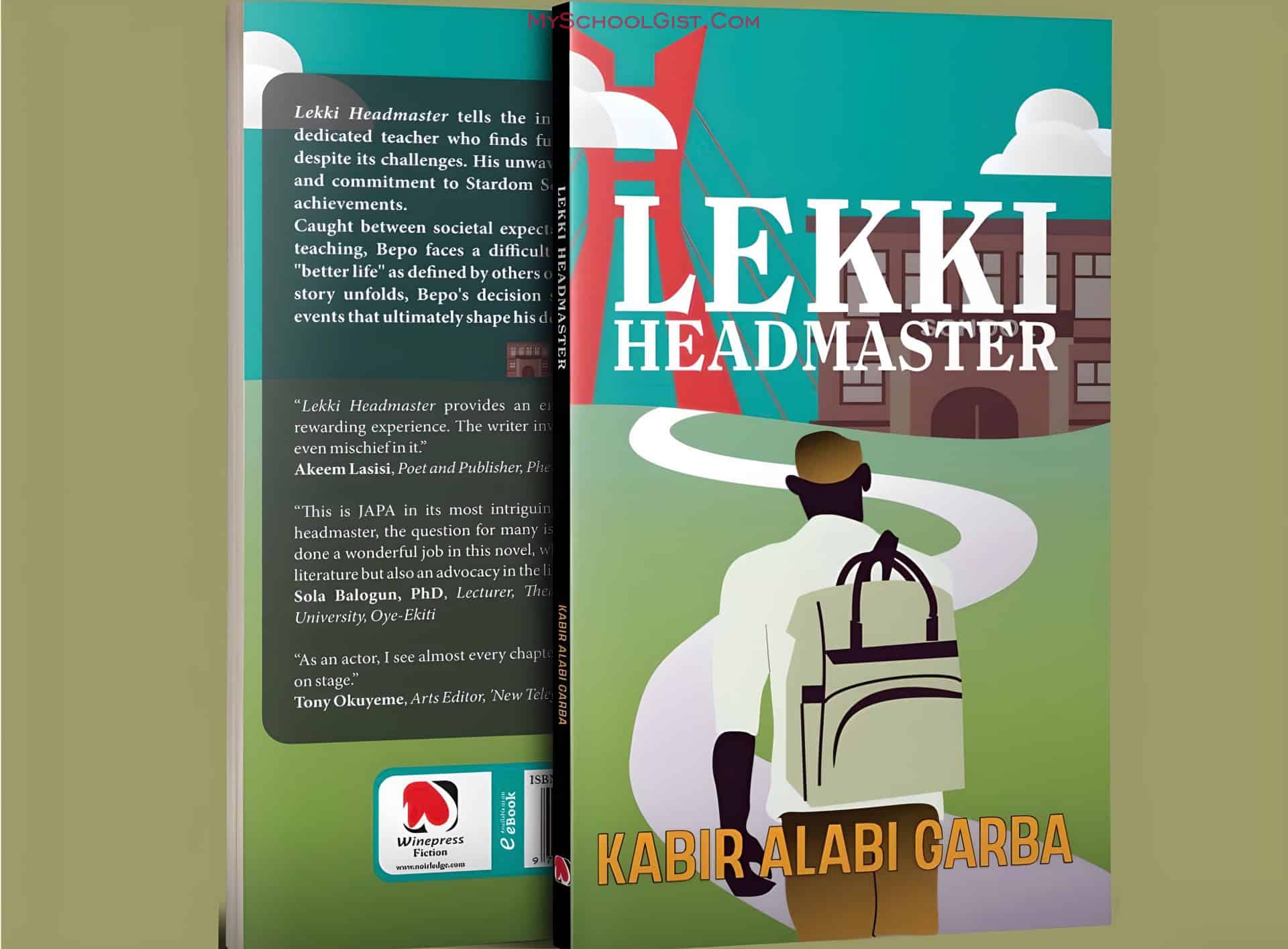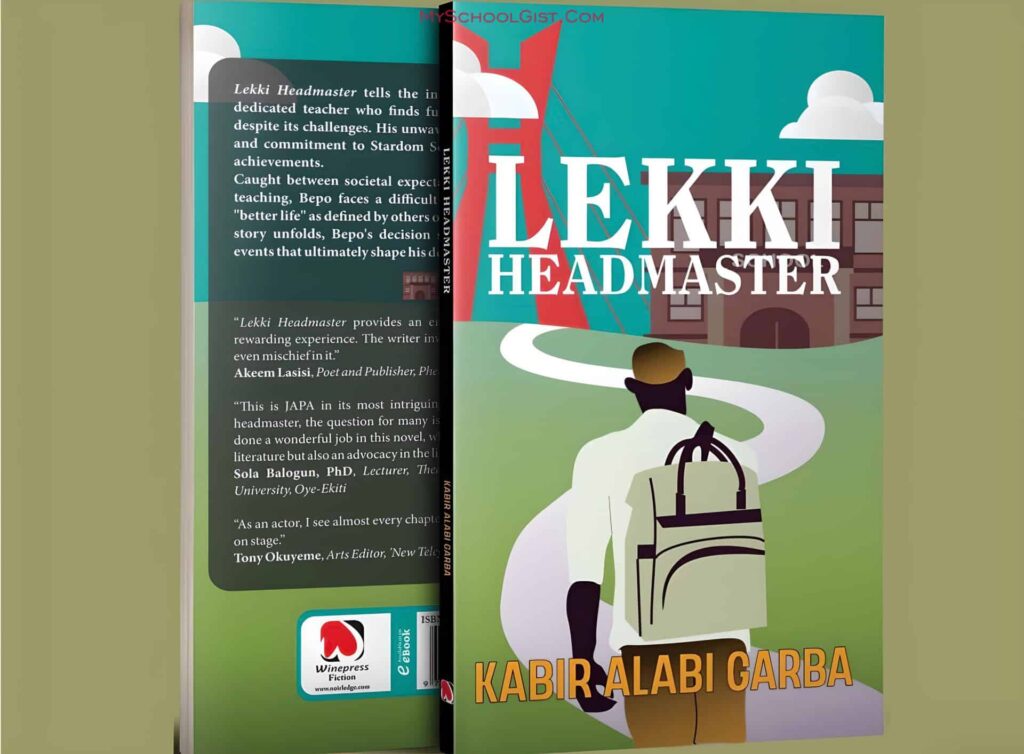JAMB introduces “The Lekki Headmaster” as the new reading text for 2025 UTME Use of English. Learn about its themes, summary, and access options for the novel. Continue reading for full details.

The Joint Admissions and Matriculation Board (JAMB) has selected The Lekki Headmaster by Kabir Alabi Garba as the official reading text for the 2025 UTME Use of English.
This change replaces The Life Changer, providing candidates with a fresh narrative and enriching their reading experience.
How to Get “The Lekki Headmaster”
During JAMB Registration
Candidates registering at JAMB-accredited CBT Centres will receive a physical copy of the novel.
Why Read “The Lekki Headmaster”?
Reading “The Lekki Headmaster” offers several compelling reasons that make it a worthwhile experience:
1. Insight into Educational Challenges: The novel provides a deep exploration of the complexities and challenges faced by educators in a private school setting. It highlights issues such as financial instability, staff incompetence, and the pressures of maintaining educational standards.
2. Relatable Characters: The protagonist, Bepo, is a relatable character who embodies the struggles and dedication of many teachers. His journey reflects the passion and commitment required to navigate the educational landscape, making it easy for readers to connect with his experiences.
3. Cultural Context: Set in Nigeria, the novel offers a glimpse into the cultural and societal expectations surrounding education. Readers gain an understanding of the unique challenges faced by schools in developing nations, enriching their perspective on global educational issues.
4. Themes of Integrity and Accountability: The narrative emphasizes the importance of integrity and accountability in education. It prompts readers to reflect on their values and the ethical responsibilities of educators and administrators.
5. Engaging Writing Style: The author employs wit, humour, and suspense throughout the story, making it an engaging read. The use of dialogue and character interactions adds depth to the narrative, keeping readers invested in the plot.
6. Reflection on Personal Sacrifice: The novel explores the theme of personal sacrifice in the pursuit of education. It sheds light on the lengths to which educators go to support their students, prompting readers to appreciate the dedication of teachers.
7. Discussion of Community Involvement: The story highlights the role of parents and the community in shaping the educational experience. It encourages readers to consider the importance of collaboration between schools and families.
8. Inspiration for Educators: For those in the education field, “The Lekki Headmaster” serves as an inspiring reminder of the impact teachers can have on their students’ lives. It reinforces the idea that dedication and passion can lead to meaningful change.
9. Thought-Provoking Questions: The novel raises important questions about the future of education, the balance between personal aspirations and societal expectations, and the definition of success. These questions can lead to meaningful discussions among readers.
10. Entertainment Value: Beyond its educational themes, the novel is entertaining and enjoyable. The blend of drama, humour, and relatable situations makes it a captivating read for anyone interested in stories about education and personal growth.
In summary, “The Lekki Headmaster” is not just a story about a school; it is a reflection on the broader themes of education, integrity, and the human experience. It invites readers to engage with important issues while enjoying a well-crafted narrative.
The Lekki Headmaster Summary
The story centres on Bepo, a dedicated teacher at Stardom Schools, who faces numerous challenges in his efforts to improve students’ learning conditions.
The Managing Director (MD) grows concerned about staff suddenly displaying wealth, owning expensive cars, and possibly mismanaging funds. This suspicion escalates when the Stardom Cooperative Society reveals large financial reserves, leading to a decision to limit staff loans.
The MD also highlights staff incompetence, particularly when a parent discovers a grammatical error in a note written by the English teacher, Fafore. This incident sparks outrage and threatens the school’s reputation.
Bepo finds himself torn between loyalty and integrity when he observes the director engaging in unethical practices that could harm students. He struggles with whether to expose these actions, knowing the risks involved.
Themes Explored
The novel examines authority, ethics, and the difficulties of upholding education standards. It sheds light on the complexities educators face within flawed systems, offering a mix of wit, suspense, and critical insights.
100 Questions and Answers for The Lekki Headmaster Novel
- Question: Who is the main protagonist of “The Lekki Headmaster”?
Answer: The main protagonist is Bepo, a dedicated teacher at Stardom Schools. - Question: What concerns does the Managing Director (MD) have regarding the staff?
Answer: The MD is concerned about the sudden display of wealth among the staff, particularly their ownership of expensive cars, which raises suspicions of potential theft or mismanagement of funds. - Question: What financial institution is mentioned in the novel that the staff are involved with?
Answer: The Stardom Cooperative Society is mentioned as a financial institution that has amassed a significant amount of money. - Question: What incident involving an English teacher causes embarrassment for the school?
Answer: A parent discovers a grammatical error in a note given to students by the English teacher, Fafore, leading to outrage and threatening the school’s reputation. - Question: What decision does the board make regarding staff loans?
Answer: The board decides to limit loan amounts to staff to prevent financial instability and potential rebellion. - Question: How does Bepo feel about his role as a teacher?
Answer: Bepo is portrayed as a passionate educator who genuinely cares for his students and strives to provide them with the best education possible. - Question: What moral dilemma does Bepo face in the novel?
Answer: Bepo grapples with the decision of whether to report the director’s questionable actions that could endanger the health of students. - Question: What themes are explored in “The Lekki Headmaster”?
Answer: Themes of authority, integrity, and the challenges of maintaining educational standards are explored throughout the novel. - Question: How does the MD respond to the incompetence of the teaching staff?
Answer: The MD emphasizes the importance of professionalism and declares that the school will no longer tolerate incompetence among the teachers. - Question: What does Bepo’s character represent in the context of the novel?
Answer: Bepo’s character embodies the passion and dedication required to navigate the challenges faced by educators in contemporary society. - Question: What is the primary setting of “The Lekki Headmaster”?
Answer: The primary setting is Stardom Schools, a private educational institution. - Question: What does the MD fear might happen if the staff becomes dissatisfied?
Answer: The MD fears that the staff might rebel and establish their own school. - Question: How does the board meeting reflect the financial state of the school?
Answer: The board meeting reveals concerns about the financial stability of the school and the need to manage staff loans carefully. - Question: What is the significance of the title “The Lekki Headmaster”?
Answer: The title signifies the central role of the headmaster, Bepo, in navigating the challenges faced by the school in the Lekki area. - Question: What does Bepo think about the idea of sprinkling grains of corn at the school?
Answer: Bepo is skeptical about the effectiveness of the ritual proposed by a parent to attract more pupils to the school. - Question: How does the MD’s attitude towards the staff change throughout the novel?
Answer: The MD becomes increasingly frustrated with the staff’s performance and emphasizes the need for accountability. - Question: What role does the cooperative society play in the story?
Answer: The cooperative society serves as a financial resource for staff but also raises concerns about mismanagement and potential rebellion. - Question: How does Bepo’s dedication to his students manifest in the story?
Answer: Bepo goes above and beyond to ensure his students receive quality education and support, despite the challenges he faces. - Question: What is the reaction of the staff to the MD’s concerns about financial mismanagement?
Answer: The staff is initially defensive but some begin to recognize the need for change and accountability. - Question: What does the MD do to address the issue of staff incompetence?
Answer: The MD implements stricter standards for teaching performance and emphasizes the importance of professionalism. - Question: How does the community perceive Stardom Schools?
Answer: The community has mixed feelings, with some praising the school while others criticize its management and staff performance. - Question: What is the significance of the photographer capturing moments during the board meeting?
Answer: The photographer’s presence symbolizes the importance of the event and the desire to document significant changes within the school. - Question: How does Bepo handle the pressure from the MD regarding staff performance?
Answer: Bepo tries to mediate between the MD’s expectations and the realities faced by the staff, advocating for support and improvement. - Question: What does the MD mean by “the depth of our souls” when addressing the staff?
Answer: This phrase indicates the sincerity and emotional investment of the management in the well-being of the staff and the school. - Question: How does the novel portray the relationship between teachers and management?
Answer: The relationship is depicted as tense, with communication issues and differing expectations leading to conflict. - Question: What role does humor play in the interactions among characters?
Answer: Humor is used to lighten tense situations and foster camaraderie among staff, despite underlying issues. - Question: How does the author use dialogue to develop characters?
Answer: Dialogue reveals the personalities, motivations, and conflicts of characters, providing insight into their relationships. - Question: What is the impact of the financial issues on the students?
Answer: Financial issues lead to concerns about the quality of education and resources available to students. - Question: How does the novel address the theme of integrity in education?
Answer: The narrative emphasizes the importance of ethical behavior among educators and the consequences of failing to uphold integrity. - Question: What does Bepo learn about leadership throughout the story?
Answer: Bepo learns that effective leadership requires balancing authority with empathy and understanding the needs of both staff and students. - Question: How does the MD’s leadership style affect the school environment?
Answer: The MD’s authoritative style creates a tense atmosphere, but her commitment to improvement also inspires some staff members. - Question: What challenges does Bepo face in his personal life?
Answer: Bepo struggles with the pressures of his job while trying to maintain a work-life balance and support his family. - Question: How does the author depict the educational system in Nigeria?
Answer: The author portrays the educational system as facing numerous challenges, including financial instability and varying levels of teacher competence. - Question: What role do parents play in the narrative?
Answer: Parents are depicted as stakeholders in the school, influencing decisions and expressing concerns about their children’s education. - Question: How does the MD’s concern for the school’s reputation drive her actions?
Answer: The MD’s desire to maintain a positive reputation leads her to take decisive actions to address staff performance and financial issues. - Question: What is the significance of the title “The Lekki Headmaster”?
Answer: The title highlights Bepo’s role as a headmaster in a specific geographic and cultural context, emphasizing local challenges. - Question: How does the novel explore the concept of community involvement in education?
Answer: The narrative illustrates the importance of community support and involvement in enhancing the educational experience for students. - Question: What are some of the ethical dilemmas faced by Bepo?
Answer: Bepo faces dilemmas related to reporting misconduct, balancing loyalty to colleagues with the need to protect students. - Question: How does the author use symbolism in the novel?
Answer: Symbolism is used to represent broader themes, such as the corn ritual symbolizing hope for growth and prosperity. - Question: What is the role of technology in the school environment depicted in the novel?
Answer: Technology is portrayed as both a tool for education and a source of distraction, reflecting contemporary challenges in schools. - Question: How does the MD’s approach to problem-solving differ from Bepo’s?
Answer: The MD tends to take a more authoritative and immediate approach, while Bepo prefers a collaborative and empathetic method. - Question: What impact does the cooperative society have on staff morale?
Answer: The cooperative society can boost morale by providing financial support, but it also creates tension regarding its management. - Question: How does the author depict the challenges of teaching in a private school?
Answer: The author illustrates the pressures of meeting high expectations from management and parents while maintaining educational standards. - Question: What does the MD’s reaction to the staff’s financial behavior reveal about her character?
Answer: The MD’s reaction shows her commitment to accountability and her concern for the school’s integrity. - Question: How does Bepo’s relationship with his colleagues evolve throughout the story?
Answer: Bepo’s relationships with colleagues evolve from camaraderie to tension as financial and performance issues come to the forefront. - Question: What role does communication play in the effectiveness of the school management?
Answer: Effective communication is crucial for addressing issues and fostering a positive school culture, which is often lacking in the narrative. - Question: How does the author use foreshadowing in the plot?
Answer: Foreshadowing is used to hint at future conflicts and resolutions, particularly regarding staff performance and financial stability. - Question: What are the consequences of the director’s questionable actions?
Answer: The consequences include potential harm to students and a loss of trust in the school’s leadership. - Question: How does the novel address the theme of personal sacrifice in education?
Answer: The narrative highlights the sacrifices educators make for their students, often at the expense of their own well-being. - Question: What is the significance of the board meeting in the overall narrative?
Answer: The board meeting serves as a turning point for addressing critical issues and setting the direction for the school’s future. - Question: How does the author portray the relationship between education and socioeconomic status?
Answer: The author illustrates how socioeconomic status influences access to quality education and resources within the school. - Question: What strategies does Bepo employ to motivate his students?
Answer: Bepo uses encouragement, personalized attention, and engaging teaching methods to motivate his students. - Question: How does the MD’s leadership style impact staff retention?
Answer: The MD’s authoritative style may lead to high turnover rates among staff who feel unsupported or undervalued. - Question: What role does peer pressure play among the teaching staff?
Answer: Peer pressure influences staff behavior, with some feeling compelled to conform to the expectations set by management. - Question: How does the author use humor to address serious issues in the novel?
Answer: Humor is used to provide relief from tension while also highlighting the absurdity of certain situations within the school. - Question: What is the significance of the MD’s statement about “the depth of our souls”?
Answer: This statement emphasizes the emotional investment of the management in the school’s success and the well-being of the staff. - Question: How does the novel depict the role of mentorship in education?
Answer: Mentorship is portrayed as essential for professional development, with experienced teachers guiding newer staff. - Question: What challenges do parents face in supporting their children’s education?
Answer: Parents face challenges such as financial constraints and navigating the school’s expectations and policies. - Question: How does the author illustrate the impact of external pressures on the school?
Answer: External pressures, such as competition from other schools and societal expectations, influence the school’s management decisions. - Question: What is the role of tradition in the school’s culture?
Answer: Tradition plays a significant role in shaping the school’s identity and influencing the behavior of staff and students. - Question: How does Bepo’s character reflect the struggles of modern educators?
Answer: Bepo embodies the challenges faced by educators, including balancing personal values with institutional demands. - Question: What are the implications of the financial decisions made by the board?
Answer: Financial decisions impact the school’s ability to provide quality education and maintain staff morale. - Question: How does the author use character development to convey themes?
Answer: Character development illustrates the complexities of educational leadership and the moral dilemmas faced by educators. - Question: What is the significance of the corn ritual proposed by a parent?
Answer: The corn ritual symbolizes hope for growth and prosperity, reflecting the community’s desire for the school’s success. - Question: How does the MD’s perception of the staff change over time?
Answer: The MD’s perception shifts from viewing the staff as a cohesive unit to recognizing individual shortcomings and challenges. - Question: What role does accountability play in the narrative?
Answer: Accountability is a central theme, with characters grappling with their responsibilities to students and the school. - Question: How does the author address the issue of teacher burnout?
Answer: The narrative highlights the pressures and challenges that contribute to teacher burnout, emphasizing the need for support. - Question: What impact does the school’s reputation have on student enrollment?
Answer: The school’s reputation directly affects student enrollment, with parents seeking quality education for their children. - Question: How does Bepo’s approach to teaching differ from that of his colleagues?
Answer: Bepo adopts a more student-centered approach, focusing on individual needs and fostering a supportive learning environment. - Question: What challenges do students face in the school environment?
Answer: Students face challenges such as inadequate resources, varying teacher competence, and external pressures from their families. - Question: How does the author use irony in the narrative?
Answer: Irony is used to highlight the contradictions between the school’s ideals and the realities faced by staff and students. - Question: What is the significance of the MD’s commitment to improvement?
Answer: The MD’s commitment reflects a desire to enhance the school’s quality and address the issues affecting staff and students. - Question: How does the novel explore the theme of resilience in education?
Answer: The narrative illustrates the resilience of educators and students in overcoming challenges and striving for success. - Question: What role does collaboration play in addressing school issues?
Answer: Collaboration among staff is essential for problem-solving and fostering a positive school culture. - Question: How does the author depict the relationship between education and community values?
Answer: The author illustrates how community values influence educational practices and expectations within the school. - Question: What are the consequences of the director’s actions on student health?
Answer: The director’s actions could potentially endanger student health, leading to a loss of trust in the school’s leadership. - Question: How does Bepo’s character evolve throughout the story?
Answer: Bepo evolves from a passionate teacher to a more assertive leader, learning to navigate the complexities of school management. - Question: What is the significance of the MD’s focus on professionalism?
Answer: The MD’s focus on professionalism underscores the importance of maintaining high standards in education. - Question: How does the author use setting to enhance the narrative?
Answer: The setting of Lekki provides a cultural context that influences the characters’ experiences and challenges. - Question: What role does empathy play in Bepo’s interactions with students?
Answer: Empathy allows Bepo to connect with students on a personal level, fostering a supportive learning environment. - Question: How does the novel address the theme of educational equity?
Answer: The narrative highlights disparities in access to quality education and resources among students. - Question: What impact does the MD’s leadership have on staff morale?
Answer: The MD’s leadership style can either boost morale through support or diminish it through authoritarian practices. - Question: How does the author portray the challenges of curriculum implementation?
Answer: The author illustrates the difficulties teachers face in effectively implementing the curriculum amidst various pressures. - Question: What is the significance of the board’s decision-making process?
Answer: The board’s decision-making process reflects the complexities of governance in educational institutions. - Question: How does Bepo’s relationship with the MD evolve throughout the story?
Answer: Bepo’s relationship with the MD evolves from one of mutual respect to tension as they navigate differing priorities. - Question: What role does mentorship play in Bepo’s development as a teacher?
Answer: Mentorship provides Bepo with guidance and support, helping him grow as an educator. - Question: How does the author use conflict to drive the narrative?
Answer: Conflict among characters serves to highlight the challenges faced in the educational environment and propel the plot forward. - Question: What are the implications of the financial decisions made by the board?
Answer: Financial decisions impact the school’s ability to provide quality education and maintain staff morale. - Question: How does the author depict the role of tradition in the school’s culture?
Answer: Tradition plays a significant role in shaping the school’s identity and influencing the behavior of staff and students. - Question: How does Bepo’s character reflect the struggles of modern educators?
Answer: Bepo embodies the challenges faced by educators, including balancing personal values with institutional demands. - Question: What challenges do parents face in supporting their children’s education?
Answer: Parents face challenges such as financial constraints and navigating the school’s expectations and policies. - Question: How does the author illustrate the impact of external pressures on the school?
Answer: External pressures, such as competition from other schools and societal expectations, influence the school’s management decisions. - Question: What is the role of tradition in the school’s culture?
Answer: Tradition plays a significant role in shaping the school’s identity and influencing the behaviour of staff and students. - Question: How does Bepo’s character reflect the struggles of modern educators?
Answer: Bepo embodies the challenges faced by educators, including balancing personal values with institutional demands. - Question: What challenges do parents face in supporting their children’s education?
Answer: Parents face challenges such as financial constraints and navigating the school’s expectations and policies. - Question: How does the author illustrate the impact of external pressures on the school?
Answer: External pressures, such as competition from other schools and societal expectations, influence the school’s management decisions. - Question: What is the role of tradition in the school’s culture?
Answer: Tradition plays a significant role in shaping the school’s identity and influencing the behaviour of staff and students. - Question: How does Bepo’s character reflect the struggles of modern educators?
Answer: Bepo embodies the challenges faced by educators, including balancing personal values with institutional demands. - Question: What challenges do parents face in supporting their children’s education?
Answer: Parents face challenges such as financial constraints and navigating the school’s expectations and policies. - Question: How does the author illustrate the impact of external pressures on the school?
Answer: External pressures, such as competition from other schools and societal expectations, influence the school’s management decisions.


